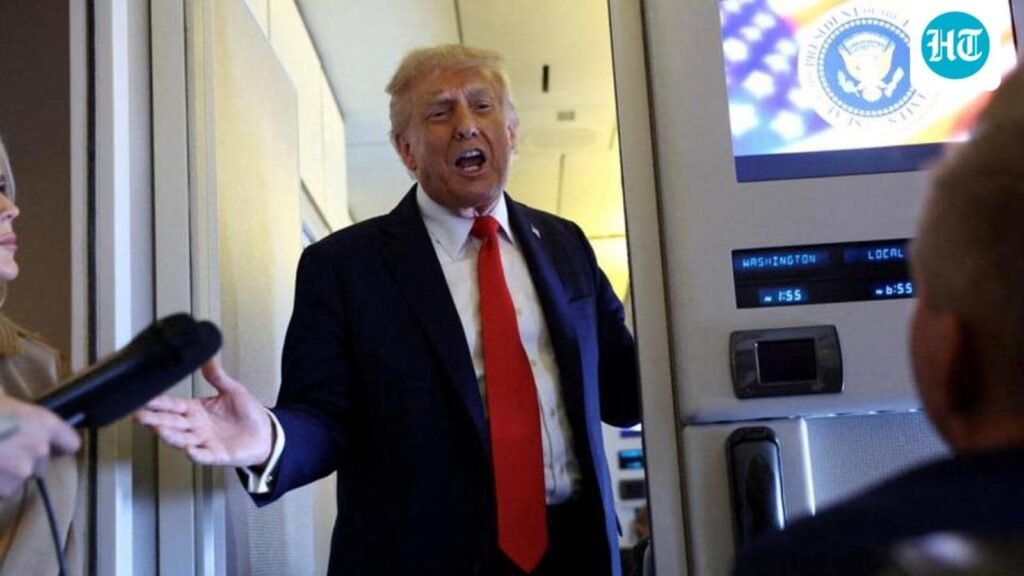“This is devastating. I can’t express it in words,” said one Indian technology professional in Silicon Valley to HT as news of US President Donald Trump’s H1-B visa fee hike spread on Saturday.
“I’ve invested a lot of time here in America. I’m staying positive right now but there are times when it’s hard,” adds another Indian professional on an Optional Practical Training (OPT) visa, who was hoping to secure an H1B sponsorship and stay on in America after completing a master’s degree.
A pervasive mood of fear and uncertainty looms large among many in the Indian diaspora, particularly young professionals working for technology firms.
For these individuals, the Trump administration’s decision to hike H1-B visa application fees to $100,000 per foreign worker has shrunk an already narrow window for Indian professionals to work in America.
For decades, Indian students arriving in the United States on F1 student visas were able to find jobs with companies that were willing to sponsor them for H1-B visas and subsequently, for employment based green cards.
This pathway became the basis of the Indian-American dream and allowed many in India’s 5-million strong diaspora to set down roots in America.
Also Read:‘Disruption for families’: India’s first response to Trump’s $100k H-1B visa fee
After Trump’s H1B visa decision, many in the diaspora believe that pathway is fundamentally broken.
“The education pathway of coming to America and subsequently staying in the United States will collapse because these visa moves make it so much harder for entry level workers to find a job,” says Debarghya Das, a partner at Menlo Ventures, a Silicon Valley-based venture capital firm.
“For an Indian master’s student, it is not a wise decision to come to America right now,” says another Indian professional on an H1B visa, speaking on the condition of anonymity.
Many in the diaspora told HT that Trump’s H1-B visa fee hike decision only compounds the negative impact of other visa changes over the last year.
“Processing times for many visa categories, including green cards, have shot up. The US government is making more requests for information during the H1-B visa process, which can cause delays. Because of layoffs in the tech industry, many companies that used to sponsor H1-B visas and green cards are not legally eligible to do this anymore,” explains Sophie Alcorn, a Silicon Valley-based immigration lawyer who works closely with Indian professionals in the tech sector.
Alcorn says she has received a number of frantic and anxious messages from Indian professionals who are uncertain about how Trump’s visa decision will impact them.
“I’ve already had friends whose companies have laid them off because they don’t want to go through the hassle of sponsoring them for visas,” says a young Indian tech professional who works for a Big Tech firm.
In addition, many in the diaspora fear that speaking out on the issue, especially on social media, will invite blowback from the Trump administration. Almost all the Indian visa holders who spoke to HT for this story requested anonymity for fear of adverse visa decisions.
The charged political rhetoric around H1-B visas has worried many in the diaspora.
Prominent conservative activists like Laura Loomer and Steve Bannon, who are close allies of President Trump, have attacked the H1-B program. Senior figures in the Trump administration, including Vice President JD Vance, have harshly criticised the visa program in recent months.
The administration’s penchant for announcing sudden changes to visa policies have only added to the fear and uncertainty among the Indian diaspora in America.
Many told HT that they have cancelled plans to travel because of Trump’s H1-B proclamation, which proposes restrictions on entering the US for H1-B visa holders whose companies have not made the $100,000 visa fee payment. One Indian professional told HT he was forced to abruptly cancel a vacation in Canada, while others have frantically made efforts to return to America before the policy goes into effect on September 21.
Some younger Indian professionals told HT that they are resigned to the fact that the Indian-American tech dream is effectively over.
“Realistically, I don’t think I’m ever going to get a green card to stay in America long term like many people before me,” says one engineer in his 20s, who moved to America for an undergraduate degree.
“If you came from a second or third tier university in India to America back in 2005, you were in a better position to get a visa than if you come from a top tier institution now,” muses an analyst who works at a hedge fund on an H1B visa.
Many are resigned to leaving America and are actively looking at opportunities in other countries.
“Some people I know are looking at Canada, Europe, Singapore and other such countries as an alternative. Lots of people have also just gone back to India,” adds another Indian engineer who secured an H1B visa.
“I would like to go back to America but it’s not my retirement dream. If you have aspirations beyond working for a Big Tech firm, America and the H1-B visa isn’t the way for you,” says Dhruv Sirsikar, an engineer at Microsoft who moved to Canada after being unable to secure an H1-B visa. Sirsikar says he would be comfortable moving back to India, where the tech ecosystem has developed more strongly over the last decade.
But others remain cautiously optimistic and are determined to stay on in America if they can.
“The Indian-American dream isn’t totally dead. I do think some of the best opportunities have decreased. But the US tech ecosystem remains the strongest in the world,” says one H1-B visa holder who intends to stay on in America.
“For the very best talent from India, America remains a great option. But, for 95% of people, things have gotten worse,” concludes another.

